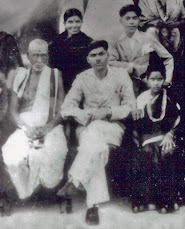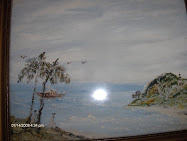The sign boards were getting fewer and far between as Hamsa walked on.
Here was PLANNER'S PARLOUR: Hamsa was interested. This colony, too, came of ancestors that went this way, going from somewhere to somewhere.
They halted for a night's rest - Someone discovered that the rations would not last more than a day. There would be some difficulty, too, with water. It became quite clear that if they had planned carefully, this calamity would not have occurred, and there would have been no difficulty two days hence. Where would they be if at end of two days they found themselves in a dessert.
It was clear that they should not set out on the journey without at least a month's reserve in hand. -This reserve had to be built up on the expectation of meeting one desert every week of journey. - And another fortnight's super-reserve to cover contingencies. Seeing how important all this was, they settled down to produce food. It took one year for getting to store a six week reserve. At the end of the year they found that their own number had doubled, and all in all they settled down to produce reserve stocks for one year.
Meantime new recruits joined. Some came from Boner's rest, some from Efficiency Bar, and hybrids were produced. Between them they managed to keep the colony quite gainfully employed and highly interesting.
One gentleman, Hamsa met, was fully occupied with the question of balancing people against food. He looked grim, for a visitor from Efficiency Bar wanted to know how the planners planned all without first Knowing if people ate at all; if so the correct operational definition for eating and all that basic data.
Another gentleman looked grim as well as glum: the sun was getting colder, one had to carefully plan so that its effects on food production could be projected on to its effects on population. The Efficiency Bar man said that he was not sure if he understood correctly - was the sun getting colder or the earth getting hotter; a matter of relativity, and this has always to be kept in mind.
It was quite clear. "Planning is no joke," one colonist said.
"But it is all delightful," said Hamsa, "very colourful, too," pointing to a number of multicoloured charts the gentleman showed.
"You will be soon on your journey, I hope, with sufficient reserves in hand," said Hamsa.
What journey?" the colonist asked, "God, man, this work takes years and years and ages and generations, and I haven't had a week's holiday. I am planning to accumulate my leave and retire someday with 2 years extra pay, and the plan for my house is all ready; and then after my son passes the planner's higher grade examination, I should be ready for the next plan!"
Our journey became increasingly pleasant. We quickly passed through a cluster of minor colonies.
There was the MARKET SQUARE: this was the spot where some earlier travellers had found that each had something he did not need, and that this could be exchanged for something the other had and did not need. Then they found that many travellers had come without certain necessary things and the colony had them. They settled down to be helpful to one another in the useful occupation of exchanging unwanted things.
A more prosperous colony, in fact, the last time Hamsa met, was the DOUBTER'S DUMP: This was a colony sprung from an original group that rested here for a day. Suddenly one of them wanted to know if they were sure they were going the right way. Before this could be satisfactorily settled another was not sure if all this was worth it - how do you know that the somewhere would be better, and not infinitely worse? Then they settled down to clear the doubts and the methods for clearing them, and the methods for clearing the doubts about the methods adopted for clearing doubts. This colony became the main source of inspiration to the many other colonies we met on the way: they kept the other colonies quite busy. They frequently sent messengers down the path warning the travellers that they should not venture further till matters were at least a little more clear.
As Hamsa moved on, one of the colonists wanted to know if Hamsa was sure if the road did not suddenly vanish at the next turning. Hamsa said it would find out about it, and walked on.
Here was PLANNER'S PARLOUR: Hamsa was interested. This colony, too, came of ancestors that went this way, going from somewhere to somewhere.
They halted for a night's rest - Someone discovered that the rations would not last more than a day. There would be some difficulty, too, with water. It became quite clear that if they had planned carefully, this calamity would not have occurred, and there would have been no difficulty two days hence. Where would they be if at end of two days they found themselves in a dessert.
It was clear that they should not set out on the journey without at least a month's reserve in hand. -This reserve had to be built up on the expectation of meeting one desert every week of journey. - And another fortnight's super-reserve to cover contingencies. Seeing how important all this was, they settled down to produce food. It took one year for getting to store a six week reserve. At the end of the year they found that their own number had doubled, and all in all they settled down to produce reserve stocks for one year.
Meantime new recruits joined. Some came from Boner's rest, some from Efficiency Bar, and hybrids were produced. Between them they managed to keep the colony quite gainfully employed and highly interesting.
One gentleman, Hamsa met, was fully occupied with the question of balancing people against food. He looked grim, for a visitor from Efficiency Bar wanted to know how the planners planned all without first Knowing if people ate at all; if so the correct operational definition for eating and all that basic data.
Another gentleman looked grim as well as glum: the sun was getting colder, one had to carefully plan so that its effects on food production could be projected on to its effects on population. The Efficiency Bar man said that he was not sure if he understood correctly - was the sun getting colder or the earth getting hotter; a matter of relativity, and this has always to be kept in mind.
It was quite clear. "Planning is no joke," one colonist said.
"But it is all delightful," said Hamsa, "very colourful, too," pointing to a number of multicoloured charts the gentleman showed.
"You will be soon on your journey, I hope, with sufficient reserves in hand," said Hamsa.
What journey?" the colonist asked, "God, man, this work takes years and years and ages and generations, and I haven't had a week's holiday. I am planning to accumulate my leave and retire someday with 2 years extra pay, and the plan for my house is all ready; and then after my son passes the planner's higher grade examination, I should be ready for the next plan!"
Our journey became increasingly pleasant. We quickly passed through a cluster of minor colonies.
There was the MARKET SQUARE: this was the spot where some earlier travellers had found that each had something he did not need, and that this could be exchanged for something the other had and did not need. Then they found that many travellers had come without certain necessary things and the colony had them. They settled down to be helpful to one another in the useful occupation of exchanging unwanted things.
A more prosperous colony, in fact, the last time Hamsa met, was the DOUBTER'S DUMP: This was a colony sprung from an original group that rested here for a day. Suddenly one of them wanted to know if they were sure they were going the right way. Before this could be satisfactorily settled another was not sure if all this was worth it - how do you know that the somewhere would be better, and not infinitely worse? Then they settled down to clear the doubts and the methods for clearing them, and the methods for clearing the doubts about the methods adopted for clearing doubts. This colony became the main source of inspiration to the many other colonies we met on the way: they kept the other colonies quite busy. They frequently sent messengers down the path warning the travellers that they should not venture further till matters were at least a little more clear.
As Hamsa moved on, one of the colonists wanted to know if Hamsa was sure if the road did not suddenly vanish at the next turning. Hamsa said it would find out about it, and walked on.











